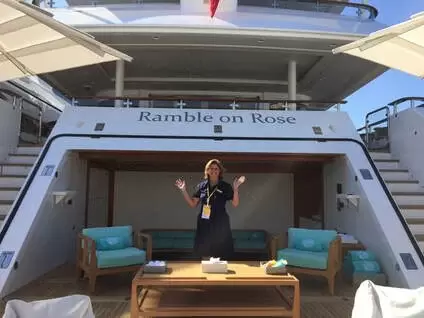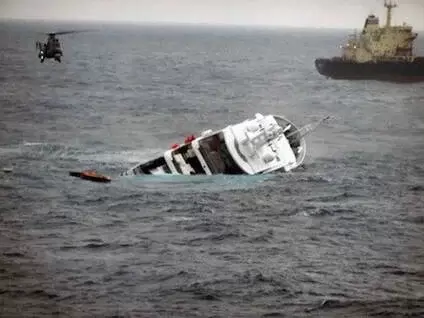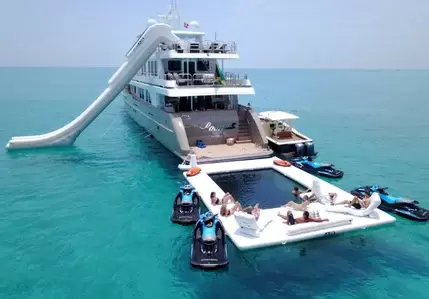|
8/14/2020 SPOTLIGHT Interview with Ms. Jolis-Fox: Life on Super-yachts with the Ultra-high Net Worth Rose Jolis-Fox Rose Jolis-Fox This week's featured service industry professional is with Ms. Rose Jolis-Fox, who has 25 years of experience working in the luxury yachting industry. You’ve had a storied career in yachting. How did you get into the business? I started out working on board a boat on the Great Barrier Reef in Australia. The boats were all about scuba diving and fishing for 1,000-pound Black Marlin. During that time, they catered to mostly American clients; so I was hired on as the American chef. From there I was hired-on to much larger yachts as a chef to UHNW clients. I loved working directly face to face with clients, so I moved to the front of the house and worked as a Purser on board. The families all were very adventurous, and we literally travelled the world.  Working with the UHNW: Lifestyle Management Working with the UHNW: Lifestyle Management What are some misconceptions that people have about the mega-yacht industry? That when there are no guests on board you are not working and live in the yacht as if it were your own. You work tremendously hard as a crew member while on board. When there are guests on board, a traditional day is working 18 hours long. I am not joking. You are on your feet for 18 hours and only truly get a break to shower and change into your evening uniform. Sometimes the chef will have just gone to bed and suddenly be woken up to make a 4:00 am meal for guests just returning to the yacht after an evening of nightclubbing. When there are no guests on board, then a traditional 8-hour day is worked completing all the maintenance: uber-stringent cleaning procedures, re-stocking provisions, and sometimes relocate the vessel as requested by the principal.  The importance of safety for workers The importance of safety for workers Back in 2012, the yachting world was stunned to learn that a billionaire’s superyacht sank in stormy waters off the coast of Greece. What is the most dangerous situation that you or one of your colleagues have been in? I have been in so many scary situations at sea. We were on our way around the northern part of Australia to Perth for the America’s Cup, and I was in a cyclone (southern hemisphere hurricane) off of the NW coast of Australia where our wind speed indicator flew off at 100 miles per hour. Another time our boom broke when the wind jibed our 100’ Sloop crossing the Atlantic. I have a tremendous amount of respect for the oceans and mother nature. From both an ethical and legal standpoint, can a captain or any crew refuse to launch a yacht if they feared for their safety? The captain is completely responsible for the safety of the vessel and their guests. So, yes, they can refuse to launch the yacht. There are also strict flag state restrictions about how many guests are allowed on board the vessel when the boat is not tied to the dock. Of course, now, COVID 19 will bring up other safety concerns.  The Goal: Providing 5-star service day and night The Goal: Providing 5-star service day and night Mega-yachts are essentially floating palaces and are very complex operations. The crew on a superyacht is substantially larger than that of private aircraft. How much “training” would your average billionaire need in order to take on the responsibility of buying a superyacht and keeping it up and running year-round? Have any clients every backed-out of a commitment after learning how substantial the investment is? There is a lot to learn about owning and running a yacht, and I recommend that any client charter for several seasons before they purchase a yacht. It is a much more complex project than running an estate. For safety and manning requirements, there needs to be a lot of crew. Another reason that there are so many crew is because the owners are really looking for an extremely high level of service to be felt on board. The more toys, the more crew needed to launch them and keep everything running like a Swiss watch. The owner and their guests are on vacation and want tons of service. Of course, this is also particular to the nationality of the principal. The approximate running cost of owning a yacht is about 10% of the purchase price of the yacht. Typically, an owner may try and put their yacht into a charter fleet so that they can recoup some of their running costs. This is not a passive income platform, but every little bit helps.  Many super-yachts have toys Many super-yachts have toys Give us some numbers: If someone wanted to build a superyacht from scratch and price wasn’t an object, how much of an investment would something be in the 80 to 100-foot range (with a helicopter landing pad of course)? Prices vary with where the yachts are built and how much pedigree the client wants. I can’t really speak to a true number because it all depends on the level of finish that the client wants. Just let me say that there aren’t any 100’ yachts with helipads. You need to get in the 150++ range for a touch and go helicopter pad. Or buy what they call a toy boat where the entire back deck is dedicated to helicopters, tenders, and maybe even submarines; but there would only be basic accommodation for guests and a few crew. This is what we call a tandem boat. It carries all the toys (kitesurfing gear, surf boards, etc.) and spares and even spare fuel. It’s a great addition for a world-cruising program. It’s common in my business for an Executive Personal Assistant to suddenly be thrust into the world of private yachting because s/he was hired without experience. Perhaps the assistant was working for a celebrity or billionaire before and dealt with private jets, but not superyachts. If an assistant were to suddenly find themselves in that situation, what kind of “crash course” should they take to be somewhat versed in the field? Absolutely, the first thing would be to partner with an experienced charter or sales broker who you trust! Just like in any business, you have those that want to create long, healthy, trusting relationships and then there are those that just want to close the deal and run you over on their way through. I am happy to help answer any questions. If someone were thinking of getting into the industry, what advice would you give them? It’s a very fun but tough business. You have to wear a lot of hats and be very patient because your life is no longer your own. There is a crew-watch rotation whereby every so many days (and/or weekends), you are on WATCH. This means you do not leave the boat. No weekend time off if you are on watch. So, you might be seeing the world, but your schedule is not your own. It can be very much like working in the armed forces. With that being said, the yachts are getting larger and larger all the time; so, there is more room for really professional people who can work a rotation. Read more about a super-yacht crew. Comments are closed.
|
Domestic Staffing BlogWritten for assistants and estate managers working for celebrities, CEOs, UHNW families, billionaires and royalty. |
Search by typing & pressing enter

 RSS Feed
RSS Feed
